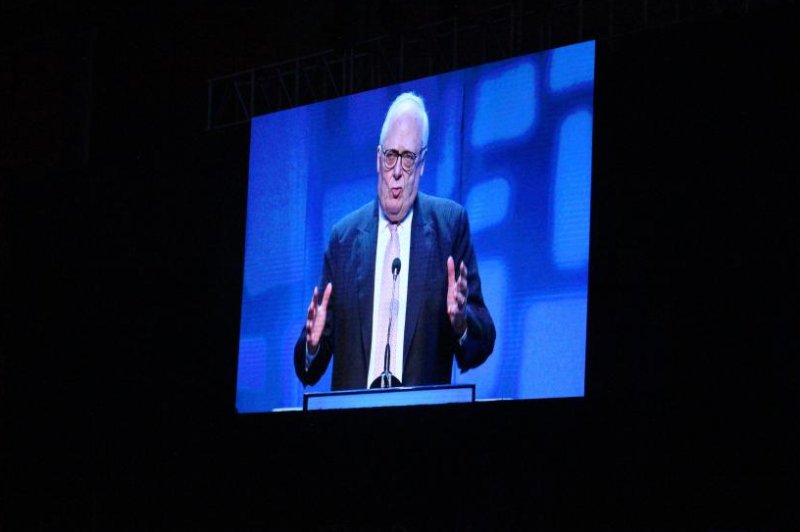Edwin Feulner, co-founder of The Heritage Foundation, stressed U.S. alliances in Asia and their importance for the Trump administration during the annual Global Peace Foundation conference in Manila, Philippines, on Tuesday. Photo by Elizabeth Shim/UPI
Feb. 28 (UPI) -- A U.S. think tank founder who advised President Donald Trump during his transition condemned the recent assassination of Kim Jong Nam as the act of an "outlaw regime."
Edwin Feulner, co-founder of The Heritage Foundation, also stressed the importance of U.S. alliances in Asia during the opening session of the annual conference of the Global Peace Foundation, a nonprofit organization that seeks to establish peace-building dialogue and support economic development around the world.
Feulner, who once served as a consultant to President Ronald Reagan, said he is a "continuing supporter" of Trump.
He sought to reassure his primarily Asian audience in Manila on Tuesday, including the many delegates of the Philippines, South Korea and Japan, who may have been concerned about Trump's campaign rhetoric.
Trump had criticized U.S. alliances with security partners like Japan and South Korea during his presidential run, a move that unsettled government officials in Tokyo and Seoul.
Feulner, a veteran adviser on Asia policy issues, highlighted instead the actions the Trump administration has taken since then -- actions, he said, that are a clear indicator of the "importance of Asia" to the new administration.
"The very first trip by the very first Cabinet member confirmed by the U.S. Senate, Secretary of Defense [James] Mattis, was not to Europe but to Asia," Feulner said, referring to Mattis' recent trip to South Korea and Japan.
Feulner also said there was significant meaning behind Trump's meetings with Japanese Prime Minister Shinzo Abe that went beyond a narrowly defined security alliance.
The meetings in New York and the White House "pointed out again not just the importance of that bilateral [U.S.-Japan] relationship but the symbolism that Asia is important to the United States of America," Feulner said.
While not mentioning the South China Sea dispute by name, Feulner said threats in the region include "borders [that] have been floating for decades but remain in dispute" that then become "major flashpoints."
Tensions between Beijing and Washington have not subsided in recent weeks, as both governments have taken turns trading accusations about provocations. China continues to build militarily on the disputed Spratly Islands, according to the Center for Strategic and International Studies.
But the most lethal threat that necessitates a "predominant American military might" that can guarantee security for the United States and its allies may be coming from North Korea and its "large stock of weapons of mass destruction...and the chemical weapons that are coming to light."
Feulner also condemned the shocking assassination of North Korean leader Kim Jong Un's half-brother Kim Jong Nam, describing the event as the act of a "president of a sovereign nation, actually ordering the assassination of a relative in a third country."
The slaying of the oldest son of former North Korea leader Kim Jong Il points to North Korea involvement, according to Seoul.
"It's truly an outlaw regime that knows no limits, apparently, to its actions," Feulner said.
The Global Peace Foundation is affiliated with the ultimate holding company that owns United Press International.















